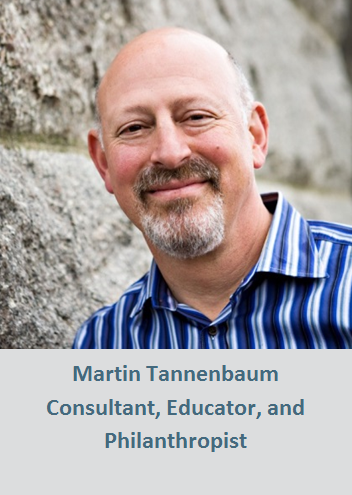This National Reentry Week, Prop 47 and expungement clinics allow individuals to move past their offenses and rejoin our communities.
By Maureen Slack, OneJustice Equal Justice Works AmeriCorps Legal Fellow
Almost one in three Americans has a criminal record. In fact, roughly the same number of Americans have criminal records as do four-year college diplomas. Before I started working on criminal record clearance clinics with the Justice Bus Project and our amazing partners, I didn’t realize the depth of the damage.
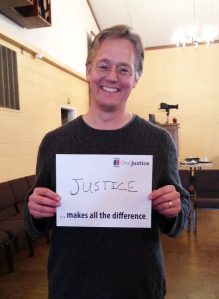
OneJustice Board member and Justice Bus Volunteer at a clinic in Napa County.
In many ways, a criminal record punishes someone long after she’s completed her sentence. And convictions from 20 or 30 years ago, minor offenses, or just arrests, carry criminal records and serious turmoil. The Proposition 47 and expungement clinics that the Justice Bus holds along with legal and community organizations provide at least some form of relief. However, as the law stands, there is no complete remedy for someone to move on.
Much of a record’s harm is economic. Most housing and employment sources require background checks and providers can make harsh snap judgments based on little information. This was our client from Napa’s experience: “I was in a volatile marriage and received a DUI in my own driveway as I got in my car for safety from my abusive husband. I lost my nursing license due to this.” And she’s not alone. Depending on the survey, up to 90% of prospective employers perform criminal background checks, as do 80% of landlords. Some research indicates that a criminal record reduces the likelihood of a job callback or offer by almost 50%. And this negative impact is more pronounced for African-American men than white men. Many clients come to clinics hoping for meaningful, full-time employment.
Beyond these economic barriers, a criminal record can also do serious emotional damage. A major part of this emotional strain comes from the economic and housing instability. Many clients also feel hurt by the stigma of being forever labeled as criminals. As one of our clients put it, “When I was young I made a mistake and got a felony conviction. That was about 15 years ago. I am now mature, a father, and hardworking… [by getting this expunged] I feel a weight has been lifted off my shoulders.” Even when someone feels they’ve moved forward from past mistakes, a record is a constant reminder of how society labels them.
While these economic and emotional barriers are severe and often unyielding, the law currently makes it really difficult to remove them. Criminal expungements and Proposition 47 offer at least some relief. Through expungement, someone can get their old conviction case re-opened and dismissed. It won’t completely erase their record, and the case will still show up on state background checks — but it won’t show up on private criminal background checks. The person can now accurately answer on most applications that they’ve never been convicted of a crime. Additionally, Prop 47 is a piece of legislation that reclassifies certain non-violent felonies as misdemeanors. Through Prop 47 relief, individuals may be able to restore their ability to get certain professional licenses and public benefits. It may also make DACA (Deferred Action for Childhood Arrivals) available to immigrants previously ineligible because of felony convictions.
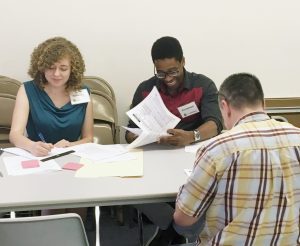
Stanford Law School students helping a client at a mobile legal clinic in Shasta County.
In 2015, the Justice Bus Project began working with veterans’ advocates in Fresno and Stockton, Public Defender’s offices, community organizations, and private criminal defense attorneys to emphasize serving veterans with criminal records in those regions. Last year it became clear to us that the need extended beyond the veteran community when non-veterans began attending these limited-scope criminal record expungement and Prop 47 clinics seeking assistance. In April 2015, the Justice Bus Project successfully piloted using the records clearance clinic model we had developed to serve veterans to help others in need of assistance. The need was so great that over the last year we began to open up many of our records clearance clinics to both veterans and civilian residents of rural and isolated communities.
Over the last year, our volunteers staffed 15 criminal record clinics in San Joaquin, Napa, Fresno, Butte, and Shasta Counties. The clients we see are overwhelmingly relieved to confront their criminal pasts and move forward. And the demand is so great that we often have a waiting list of clients whom we cannot serve at the clinics. In response, we are in the planning stages for a new series of “Rural Second Chance” clinics to try to meet more of the need around the state.
While expungements and Prop 47 provide some relief, barriers still remain, and at this point, there’s no way for a client to have a truly clean slate. We need more research on the impact of expungements and Prop 47 on people’s lives, but, anecdotally, the people who come to our clinics are hopeful for a fresh start. With the right legislation, there is hope for stronger programs to help those individuals successfully start their lives again. Until then, we will continue to bring life-changing help to those in need of these serves in rural and isolated communities.
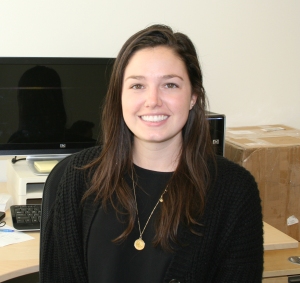 Maureen Slack is an Equal Justice Works AmeriCorps Fellow and a proud participant in Equal Justice Work’s national Veterans Legal Corps. At OneJustice, she is responsible for leading Justice Bus trips throughout Northern California, working to bring attorney and law student volunteers from urban areas to serve isolated communities.
Maureen Slack is an Equal Justice Works AmeriCorps Fellow and a proud participant in Equal Justice Work’s national Veterans Legal Corps. At OneJustice, she is responsible for leading Justice Bus trips throughout Northern California, working to bring attorney and law student volunteers from urban areas to serve isolated communities.
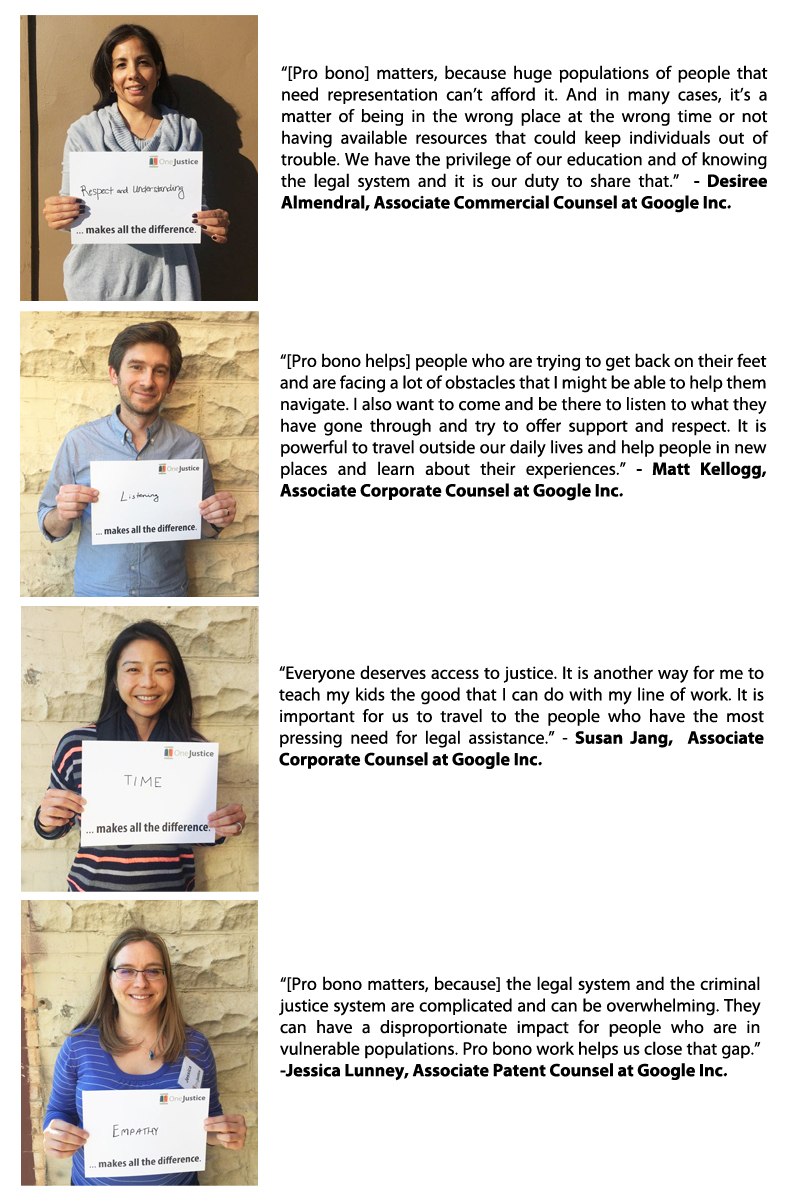
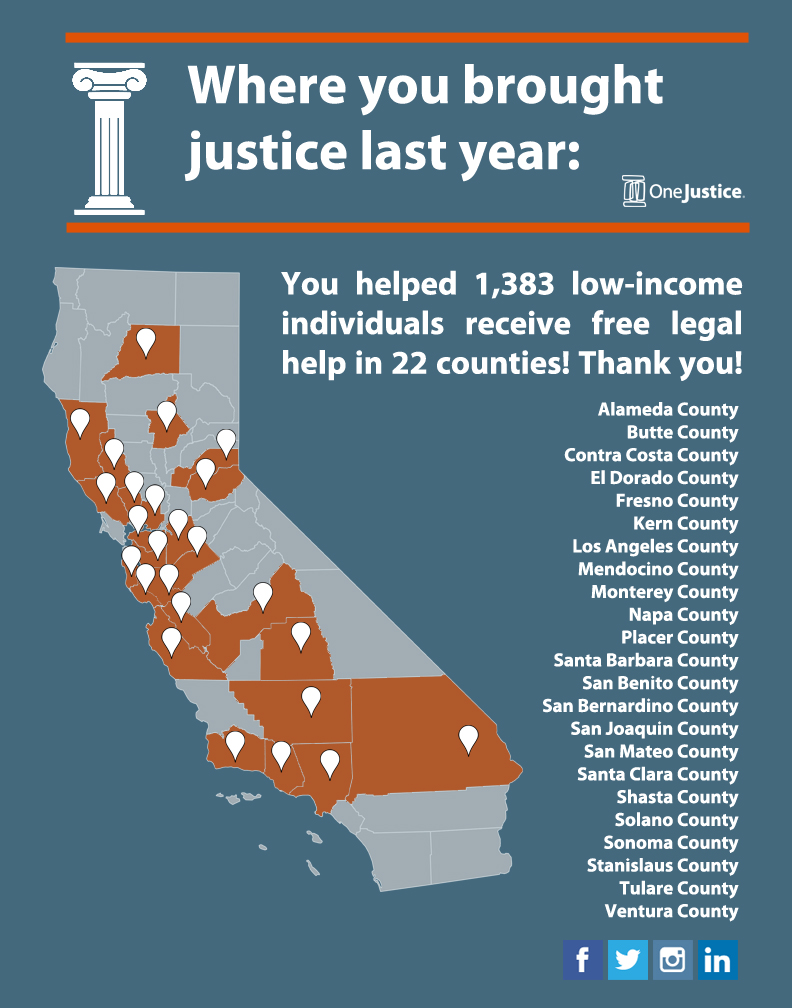
![[Photo: 2014-15 Cohort during one of their many Executive Fellowship classes, which include becoming a great communicator, human resources, financial context and ratios, and budgeting and change management.]](https://onejusticeblog.files.wordpress.com/2015/08/1466183_814970291893774_4856900012674937154_n.jpg?w=630)

